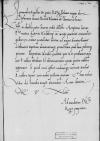Letter #2772
Sigismund II Augustus Jagiellon to Ioannes DANTISCUSVilnius, 1544-12-02
| received Heilsberg (Lidzbark), 1544-12-14 Manuscript sources:
| ||||
Text & apparatus & commentary Plain text Text & commentary Text & apparatus Excerpts concerning Dantiscus' travels
Reverendo in Christo Patri, domino
Reverende in Christo Pater sincere nobis dilecte.
Accepimus cf.
Si quid novi istic undecumque evenerit, scribat Paternitas Vestra saepius. Rem nobis factura gratam.
Et bene valeat.
Ad mandatum
s(erenissimae) or s(acrae)⌈s(erenissimae)s(erenissimae) or s(acrae)⌉


 Bcz, 1618, p. 50 (4)
Bcz, 1618, p. 50 (4)